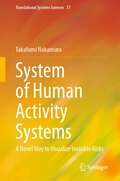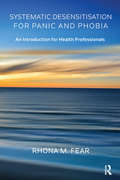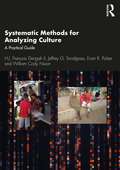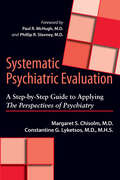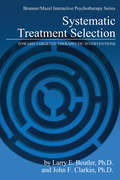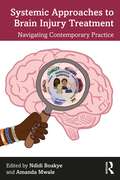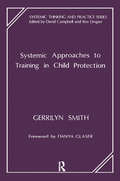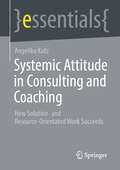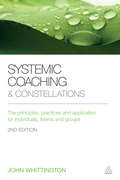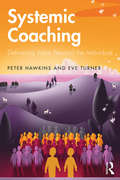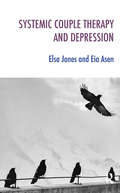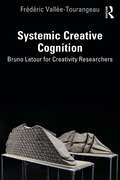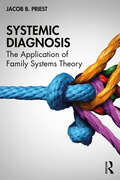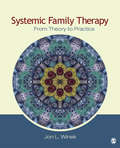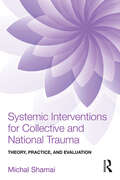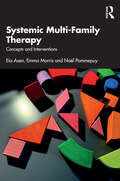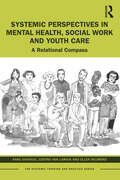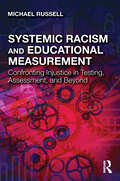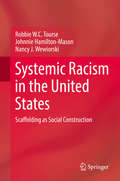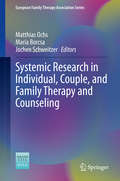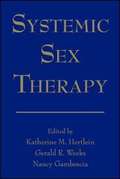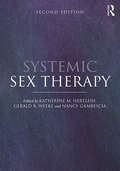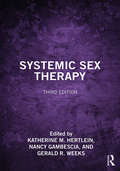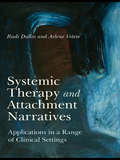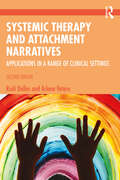- Table View
- List View
System of Human Activity Systems: A Novel Way to Visualize Invisible Risks (Translational Systems Sciences #37)
by Takafumi NakamuraThis book has unique features that set it apart from conventional books on the prevention of system failures in that it provides a method that views human activities from a meta-methodological perspective based upon an inter-disciplinary understanding of human activities. With these characteristics, the book also proposes a common methodological basis to apply to various problems surrounding society today such as an aging social infrastructure; the safety of food, medicine, and public transportation; and the creation of sustainable electricity and cybersecurity. Furthermore, since the failure of human activities is expressed in a three-dimensional space and the topological metrics are implemented, the failure trajectories can be quantitatively monitored in time series to take effective preventive measures. Considering the implementation of the topological metrics, the causes of each failure are classified into two dimensions of the degree of coupling between system elements and the interaction between the target system and the external environment. Owing to the nature of the introduction of topological metrics, all individual and diverse systems can share general topological metrics. Consequently, understanding various failures over cross-industries is possible with the use of common meta-systemic language and mutual learning between different industries, and the solution of social problems can be effectively achieved. A system of system failures (SOSF) proposed and confirmed the effectiveness of this meta-methodology for information and communication technologies (ICT) systems and the SOSF is extended to human activity systems (SOHAS: system of human activity systems) as a whole. Therefore, the SOHAS becomes an academic foundation for theoretical research on meta-methodology, and it has an impact on practitioners to prevent system failures by accumulating knowledge of failures and learning from other industries.
Systematic Desensitisation for Panic and Phobia: An Introduction for Health Professionals
by Rhona M. FearPanic disorder and phobia are difficulties that are commonly encountered in our consulting rooms. There is an ongoing debate concerning the lack of provision within the NHS to help those with mental health problems. This book puts forward a different method of recovery called systematic desensitisation, which is rarely covered by the many books that are available on the subject. Rhona M. Fear presents this method both as a former patient and as a therapist of almost thirty years' standing. It can be learned and used highly successfully by practitioners to help alleviate panic disorder and phobia.
Systematic Methods for Analyzing Culture: A Practical Guide
by H.J. François Dengah II Jeffrey G. Snodgrass Evan R. Polzer William Cody NixonSystematic Methods for Analyzing Culture is a practical manual that provides step-by-step instruction for collecting and analyzing cultural data. This compact guide explains complex topics in straightforward and practical terms, via research examples, textual and visual software guides, and hands-on exercises. Through each chapter’s introductory examples, the manual illustrates how socially learned knowledge provides group members with shared understandings of the world, which allow for mutually intelligible interactions. The authors then carefully walk readers through the process of eliciting those socially learned, shared, and thus cultural representations of reality, which structure the thinking and practice of individuals inhabiting social groups. Specifically, the book shows how researchers can elicit such thought and behavior via methods such as free lists, pile sorts, cultural consensus and consonance analysis, textual analysis, and personal network research. The book will help both undergraduate and graduate students identify ways to unpack the "black box" of culture, which may be absent or given only cursory attention within their training and respective fields. The book’s clear and systematic step-by-step walkthroughs of each method will also encourage more established researchers, educators, and practitioners—from diverse fields and with varying levels of experience—to integrate techniques for assessing cultural processes into their research, teaching, and practice.
Systematic Psychiatric Evaluation: A Step-by-Step Guide to Applying The Perspectives of Psychiatry
by Margaret S. Chisolm Constantine G. LyketsosTwo Johns Hopkins psychiatrists explain the Perspectives approach to evaluating patients with psychiatric disorders.The Perspectives approach to psychiatry focuses on four aspects of psychiatric practice and research: disease, dimensional, behavior, and lifestory. In Systematic Psychiatric Evaluation, Drs. Margaret S. Chisolm and Constantine G. Lyketsos underscore the benefits of this approach, showing how it improves clinicians' abilities to evaluate, diagnose, and treat patients.Drs. Chisolm and Lyketsos use increasingly complex case histories to help the mental health provider evaluate patients demonstrating symptoms of bipolar disorder, psychosis, suicidal ideation, depression, eating disorders, and cutting, among other conditions. The book also includes an exercise that simulates the Perspectives approach side by side with traditional methods, revealing the advantages of a method that engages not one but four points of view. Featuring a foreword by Drs. Paul R. McHugh and Phillip R. Slavney, the originators of the Perspectives approach, this innovative book will be used in psychiatric training programs as well as by practicing mental health clinicians.
Systematic Treatment Selection: Toward Targeted Therapeutic Interventions
by Larry E. Beutler John F. ClarkinFirst published in 1990. Routledge is an imprint of Taylor & Francis, an informa company.
Systemic Approaches to Brain Injury Treatment: Navigating Contemporary Practice
by Amanda Mwale Ndidi BoakyeThis book is an exploration of key systemic and socio-political considerations when working with people whose lives have been impacted by neurological injury and those who care for them. Expert contributors consider the impact of intersectionality across domains that include gender, sexuality, class, education, religion and spirituality, race, culture, and ability/disability. It offers relevant literature in the field of neuropsychology as well as clinical case studies that provide inspiration and key reflections for clinicians, neurological specialist therapists, and medical staff alike. Chapters discuss navigating intersectionality in couple therapy, hidden social inequalities in paediatric neurorehabilitation, racial microaggression in inpatient settings, and more. This book is essential for all health and social-care practitioners working in the field of brain injury and chronic illness who want to challenge the status quo and advocate for diversity and inclusion.
Systemic Approaches to Training in Child Protection: Systemic Approaches To Training In Child Protection (The Systemic Thinking and Practice Series)
by Gerrilyn SmithThis book contributes to the scientific and ideological debate on child sexual abuse and illuminates the trainer practitioner in the process by recognizing that human services training is built on the ideology and values of the sponsoring organisation, the participants, and the trainer.
Systemic Attitude in Consulting and Coaching: How Solution- and Resource-orientated Work Succeeds (essentials)
by Angelika KutzIn this Springer essentials it is shown that the action portfolio of systemics offers a wonderful basis to support clients - or a client system - in the best possible way to initiate and shape change processes (change) and to work out suitable solutions for the client system. The systemic attitude can also be learned, is a healing companion in all life situations and represents a continuous maturing process.
Systemic Coaching and Constellations
by John WhittingtonSystemic Coaching and Constellations offers a refreshingly uncomplicated path into a potentially complex subject, demonstrating how this approach can provide access to systems and deliver enduring benefits for coaching clients. This new edition offers a comprehensive introduction to the principles that sustain systems, real world descriptions of what systemic coaching is and how it can be useful as well as a step-by-step guide to integrating the principles and practices into coaching. Highly practical, Systemic Coaching and Constellations includes a wide range of exercises for application with individuals and teams. It also includes a brand new chapter on Belonging, fully updated case studies from coaches who have taken part in John's trainings, a joint ICF/EMCC constellation workshop and examples from coaches around the world, including Australia, Mexico, France, Spain, US and the Netherlands. Whether used in an initial selection meeting or to underpin all your coaching conversations and interventions, Systemic Coaching and Constellations offers an accessible, practical starting point to transform your coaching practice.
Systemic Coaching: Delivering Value Beyond the Individual
by Peter Hawkins Eve TurnerHawkins and Turner argue that coaching needs to step up to deliver value to all the stakeholders of the coachee, including those they lead, colleagues, investors, customers, partners, their local community and also the wider ecology. Systemic Coaching contains key chapters on how to contract in various settings, how to work relationally and dialogically, how to expand our own and others’ ecological awareness, how to get greater value from supervision, work with systemic ethics and expand our impact. While illustating why a new model of coaching is necessary, Hawkins and Turner also provide the tools and approaches that coaches and clients need to deliver this greater impact, accompanied by real-life case examples and interviews from the authors and other leading coaches and leaders globally. Systemic Coaching will be an invaluable resource for coaches in practice and in training, mentors, coach supervisors, consultants in leadership development and HR and L&D professionals and leaders.
Systemic Couple Therapy and Depression (The Systemic Thinking and Practice Series)
by Eia Asen Elsa JonesBased on a research project which demonstrated the effectiveness of systemic therapy, this book can be used as the basis of a training programme in systemic couple therapy, as a phase in the treatment of depression. It describes in explicit detail the range of techniques used and can therefore also inform the next generation of research studies, which will be greatly facilitated by this work.
Systemic Creative Cognition: Bruno Latour for Creativity Researchers
by Frédéric Vallée-TourangeauThis unique book explores how the conceptual framework of science and technology studies can be applied to creativity and problem-solving research, drawing from and building on the work of Bruno Latour. Using an interdisciplinary approach, the book outlines new research practices to capture the origin of ideas. Latour enjoins researchers to adopt a resolutely ethnographic methodology to trace the process by which a creative product, be it a technological innovation or a work of art, is constructed, or instaured. Creativity is explained in terms of the microprocesses that guide and constrain the development of a new idea. These microprocesses operate on and are triggered by material objects, be they maquettes, models, drafts or data representations. The resulting perspective is systemic, casting creativity as emerging from the interaction among heterogenous elements and actants. The book provides critical reflections on problem-solving research and stresses the importance of William James’s radical empiricism and the primary role of experience. The book redefines the concept of insight as an outcome rather than the cause of a new idea. The book uses the work of Latour to cast a new light on the field of creative cognition and will be an essential read for researchers and students of creativity and cognition. It will also be relevant for anyone interested in understanding the origin of creativity, ideas and thoughts.
Systemic Diagnosis: The Application of Family Systems Theory
by Jacob B. PriestSystemic Diagnosis: An Application of Family Systems Theory helps marriage and family therapists incorporate theory-driven assessment and diagnosis into their practice, demonstrating how they can diagnose systems, not just individuals. This introductory textbook argues that theory and diagnosis are key to providing excellent care in family therapy. Rooted in family systems theory, Jacob B. Priest offers readers a model to diagnosis the history, structure, and boundaries of family systems. Chapters begin by looking at traditional and relational models of diagnosis before diving into systemic diagnosis. Readers are introduced to the EPIC assessment and guided on how to use it in their practice. Filled with case studies throughout, the book also includes digital content so students can practice a diagnosis process rooted in family systems theory. Designed to be used on COAMFTE accredited programs, this book is essential for couple and family therapy students who are taking courses in assessment and mental health diagnosis and treatment.
Systemic Family Therapy: From Theory to Practice
by Dr Jon L. WinekNo other available text offers such a hands-on approach to marriage and family therapy theory. At the core of Systemic Family Therapy are comprehensive sections devoted to each developmental phase of the family therapy movement. With clear descriptions and session-by-session case examples, the author explores specific approaches within each of these phases. With this pragmatic tenor, students will gain a clear and in-depth understanding of how family theory concepts relate to practice–as well as ways those concepts interact with each other. Key Features Uses specific examples and session-by-session case studies to illustrate how theoretical construct actually work in practice Outlines the shifts in thinking of the family therapy field–from modern to postmodern Uses rich graphic representations and straightforward tables to illustrate key theoretical concepts Incorporates compelling questions and learning exercises that will lead to dynamic class discussionsIntended Audience A refreshing departure from traditional instruction of family therapy theory, this core textbook is an excellent resource for upper-level undergraduate and graduate students of family therapy, counseling, social work, and family studies.
Systemic Interventions for Collective and National Trauma: Theory, Practice, and Evaluation
by Michal ShamaiSystemic Interventions for Collective and National Trauma explains the theoretical basis for understanding collective and national trauma through the concept of systems theory, and gives ways of implementing systems theory in interventions at the micro, mezzo, and macro levels. Particular attention is given to the use of socio-political and cultural aspects of interventions with victims, as well as to the ethical codes that social workers and other mental health professionals need to integrate in their work with collective/national trauma. Separated into two distinct parts on theory and practice, this volume is appropriate for practitioners as well as students in advanced courses.
Systemic Multi-Family Therapy: Concepts and Interventions
by Eia Asen Emma Morris Noël PommepuyThis book provides a pragmatic guide to multi-family therapy (MFT), as employed in a variety of different settings: health, social care and education. Bringing six to eight families together to work on similar issues in MFT has become an increasingly successful intervention that encourages service user-participation and moves towards a more patient- and family-centred care. This text describes the concepts, therapeutic stances, interventions and techniques of MFT, bringing together all the major recent developments in the field. Specific topics covered include how to engage families in working together with up to eight families with similar issues and problems, how to set up and conduct multi-family groups and how to evaluate and develop interventions. The book covers working with and across diverse cultures, conditions and problems and includes a chapter on different MFT exercises, activities and games. Systemic Multi-Family Therapy is written for a range of practitioners, including psychotherapists, psychologists, psychiatrists, group therapists and family therapists, and will also be relevant for most professionals working in social care and schools.
Systemic Perspectives in Mental Health, Social Work and Youth Care: A Relational Compass (The Systemic Thinking and Practice Series)
by Justine van Lawick Anke Savenije Ellen ReijmersSystemic Perspectives in Mental Health, Social Work and Youth Care describes the theoretical foundations of a systemic framework, or ‘systemic lens’, and how the counsellor, therapist, social worker or other health professional can apply these ground principles in therapeutic meetings with clients. The book presents a wide variety of perspectives and interventions, multiple examples, and practical methods, applicable to professionals with a range of experience. A case study covering a diverse family of three generations is presented throughout the book to clearly illustrate systemic perspectives, concepts, and practices. This accessible book will inform and enhance the therapist’s practice and conversations with individuals, couples, parents, groups or networks, even in the presence of psychopathology, multi-stressors or complex networks. This highly readable guide will be essential reading for systemic practitioners of all backgrounds, as well as professionals looking to understand systemic approaches, and for those working in social work, youth care or mental health who want to enhance their current practice.
Systemic Racism and Educational Measurement: Confronting Injustice in Testing, Assessment, and Beyond
by Michael RussellSystemic Racism and Educational Measurement provides a theoretical and historical reckoning with racism and oppression produced through educational measurement and research methodology. As scholars and professionals in the testing, measurement, and assessment of human learning and performance work to exorcise race sciences, white supremacy, and other injustices from the field’s research and practice, new insights are needed into their root causes. This book is the first to posit that the theory of the White Racial Frame was and continues to be applied to the foundations, process, dissemination, and use of educational measurement, leading to instruments, findings, and decisions that perpetuate the racialized social structure of our nation. Even among well-meaning stakeholders who aim to improve humanity and address inequities, the White Racial Frame shapes the field’s research questions, the methods utilized, the data valued, the interpretations made, and the language used throughout. Students and scholars of educational measurement, testing, and psychometrics will find invaluable clarifications of terminology, concepts, and theories integral to understanding systemic barriers in the field; explications of educational measurement’s core purposes and its influence by the White Racial Frame; and a series of alternate frames, theories, and epistemologies intended to guide educational measurement toward anti-racism and increased fairness.
Systemic Racism in the United States: Scaffolding As Social Construction
by Robbie W. C. Tourse Johnnie Hamilton-Mason Nancy J. Wewiorski"Tourse, Hamilton-Mason, and Wewiorski discuss major concepts that help explicate the systemic nature of institutionalized racism in the U.S. – with a focus on social construction, oppression, scaffolding, and institutional web – providing insight into racist thought and behavior that construct and mark people of color as 'a problem.' […] I highly recommend this book for those who are engaged in working to combat domination and racism at the local, national, and global levels."-Gary Bailey, DHL, MSW, ACSW, Professor of Practice, Director of Urban Leadership Program, Simmons College School of Social WorkThis important volume provides a powerful overview of racism in the United States: what it is, how it works, and the social, cultural, and institutional structures that have evolved to keep it in place. It dissects the rise of legalized discrimination against four major racial groups (First Nations, Africans, Mexicans, and Chinese) and its perpetuation as it affects these groups and new immigrants today. The book’s scaffolding framework—which takes in institutions from the government to our educational systems—explains why racism remains in place despite waves of social change. At the same time, authors describe social justice responses being used to erode racism in its most familiar forms, and at its roots. This timely resource: Examines the sociology of discrimination as a constant in daily life.Traces the history of the legalization of racism in the United States.Locates key manifestations of racism in the American psyche.Links racism to other forms of discrimination.Identifies the interlocking components of institutionalized racism.Offers contemporary examples of resistance to racism.A forceful synthesis of history and social theory, Systemic Racism in the United States is vital reading for practitioners and other professionals in fields related to human rights, social policy, and psychology. And as a classroom text, it challenges its readers to deepen their understanding of both historical process and current developments.
Systemic Research in Individual, Couple, and Family Therapy and Counseling (European Family Therapy Association Series)
by Maria Borcsa Jochen Schweitzer Matthias OchsThis book examines systemic family therapy research, addressing key topics across the interrelated disciplines of psychotherapy, social work, and counseling. Drawing from contributions at the 2017 International Systemic Research Conference in Heidelberg, it includes both quantitative and qualitative research perspectives and outlines a wide array of approaches, using systems theory and constructivist epistemology. In addition, the book focuses on innovative paradigms, research strategies, and methods, seeking to bridge the gap between research and practice in the field of systemic family therapy. Finally, it provides guidance on submitting and maximizing the likelihood of research paper acceptance to leading family therapy journals. Topics featured in this book include:Effectiveness of research-informed systemic therapy.Mindfulness and compassion-based interventions in relational contexts.Use of SCORE (Systemic Clinical Outcome and Routine Evaluation) as an indicator of family functioning in Europe.Systemic approaches for working with couples with high conflict behaviors.Therapeutic-Factor-Oriented skill building in systemic counseling.Importance of client feedback in development of professional knowledge base. Systemic Research in Individual, Couple, and Family Therapy and Counseling is a must-have resource for researchers, professors, and graduate students in family therapy, clinical psychology, general practice/family medicine, and social work as well as all interrelated psychology and medical disciplines.
Systemic Sex Therapy
by Gerald R. Weeks Katherine Milew Hertlein Gerald Weeks Nancy Gambescia Katherine M. HertleinSystemic Sex Therapyserves as an introduction to the field of sex therapy from a systems perspective. It is an excellent resource for graduate students in marriage and family therapy programs or students and professionals who want a truly fresh perspective on sex therapy. This approach moves beyond traditional behavioral approaches to incorporate individual, couple, and intergenerational factors in etiology and treatment. Unlike current books on the market that are outdated, too advanced, simplistic, unfocused, or too diffuse in content, Systemic Sex Therapyis comprehensive, concise, highly focused on treatment, user-friendly, and contains features not found in other sex therapy texts, such as a systemic/behavioral focus, clinical innovation, and a greater focus on implementation rather than competing works.
Systemic Sex Therapy
by Gerald R. Weeks Nancy Gambescia Katherine M. HertleinThis comprehensive textbook, intended for graduate students in couple and family therapy programs as well as for clinicians of diverse orientations, offers descriptive discussions of sex therapy based on the Intersystem Approach, as developed by Gerald Weeks. The Intersystem Approach considers the biology, psychology, couple dyad, family-of-origin, and larger contextual factors of any sexual disorder or issue. It is grounded in systems theory and represents a new understanding of human sexuality and sexual problems. Appropriate for anyone who wants to progress to a more comprehensive and integrative understanding of sexual dysfunctions, this text will teach the reader how to treat the couple, rather than the individual. Now in a second edition, Systemic Sex Therapy presents 12 updated chapters and two new chapters, bringing the material up-to-date with the DSM-5. Each chapter examines the definition and description of a disorder, its etiology, assessment, treatment, research, and future directions. Experts in the field discuss issues ranging from pharmacology, sexual compulsivity, therapy with lesbian and gay couples, to chapters on male and female lack of desire. A standard text in the field, Systemic Sex Therapy integrates couple and sex therapy to inform the treatment of sexual problems, and to give beginning and experienced clinicians the abilities and confidence they need to produce viable change in their patients’ lives.
Systemic Sex Therapy
by Gerald R. Weeks Nancy Gambescia Katherine M. HertleinSystemic Sex Therapy, 3rd edition integrates couple and sex therapy to inform the treatment of sexual problems and to give beginning clinicians the abilities and confidence they need to produce change in their patients’ lives. Grounded in the Intersystem Approach, the book considers the biology, psychology, couple dyad, family-of-origin, and larger contextual factors of any sexual disorder or issue. Each chapter examines the definition and description of a sexual disorder or issue, its etiology, assessment, treatment, research, and future directions. This thoroughly revised edition presents 18 updated chapters consistent with the DSM-5 and features new content on sexuality and aging, infidelity, sexual interest/arousal disorder, disability, and kink/BDSM. Experts in the field discuss all the major sexual dysfunctions along with new chapters on culture, technology, and their interplay with sexual functioning. An essential text in the field, Systemic Sex Therapy sets out a conceptual framework for graduate students in couple and family therapy programs looking to develop a comprehensive, integrative understanding of sexual issues.
Systemic Therapy and Attachment Narratives: Applications in a Range of Clinical Settings
by Rudi Dallos Arlene VetereProfessional interest in the clinical applications of attachment theory continues to grow and evolve, and at the same time narrative approaches are also gaining ground. This book explores how attachment-based ideas can be used in clinical practice by offering a practical and sophisticated exposition of clinical approaches. Bringing together three main systems of thought and psychotherapeutic practice - systemic theory, attachment theory and narrative theory - practitioners are shown how to use these ideas in their work through the integrated approach of ‘attachment narrative therapy’. Using clinical examples, the authors provide guidance on how to use attachment narrative therapy in different clinical contexts and with various client groups, including working with: addictions: alcohol dependency and eating distress loss and grief trauma and dissociation love and sexuality: applications with couples. Systemic Therapy and Attachment Narratives provides practical guidance for a range of mental health professionals including family therapists, child, adolescent and adult psychotherapists, clinical psychologists and social workers, enabling them to apply this approach in a range of contexts.
Systemic Therapy and Attachment Narratives: Applications in a Range of Clinical Settings
by Rudi Dallos Arlene VetereSystemic Therapy and Attachment Narratives explores how attachment-based ideas can be used in clinical practice by offering a practical and sophisticated exposition of clinical approaches. This new edition offers an updated overview of the integrations of attachment, systemic and narrative theory, and practice incorporating key developments in developmental trauma, intergenerational trauma and neuroscience of the emotional brain. It shows how early emotional experiences set the tone of the narratives we develop about our lives and how these in turn shape our emotional connections. This edition is more oriented towards activities and features more visual representations of problematic patterns of interaction, showing their significance for the family members. It also uses clinical examples to provide guidance on using attachment narrative therapy in different clinical contexts and with various client groups. The book provides practical guidance for a range of mental health professionals including family therapists, child, adolescent and adult psychotherapists, clinical psychologists and social workers, enabling them to apply this approach in a range of contexts.
